#da meta
Text
A list of potential cures for the Calling, that we know about, that BioWare has apparently forgotten
Andraste's grace: it's not specified whether the flower the kennelmaster has you pick in the Korcari Wilds is Andraste's grace or if the game just needed a one-off asset and decided to reuse one they already had. However, in the dark future in DAI, Leliana is found to have unusual tolerance for the taint, and in DAO she talks about her mother pressing her laundry with dried Andraste's grace flowers, so it makes you wonder. Anyway, the flower stops Barkspawn becoming a ghoul and seems to make them immune to the taint from that point on.
Maric's longsword: he finds it in the Deep Roads and is suprised it isn't covered in the same Blight-rot as everything else - until, that is, he touches the sword to a patch of it and sees it wither away. Whether it's the dragonbone the sword is made of or the runes on the blade is difficult to say, though if it was just the dragonbone then it would make sense for that to be a more well-known property of the material (and would have been an interesting reason for why dragons were hunted to extinction). If Alistair carries it with him, doesit slow the progession of the taint through his body? Does he know its effects, and give it to the HoF to help keep them safer on their journey to find a permanent cure?
That obsidian dagger Duncan finds in The Calling: the dagger belonged to First Enchanter Remille - who also gave the expedition members brooches that accelerated the spread of the taint. iirc the both the dagger and the brooches are made by the Architect with Blight magic, which means the darkspawn magisters have more knowledge of how the Blight works than the Chantry attributes to them.
Whatever the fuck is going on with Avernus: he hasn't managed to cure himself yet, but he's managed to make it to 200 and the Warden can let him continue his experiments if they don't kill him - and he'd be a really useful resource if the Warden later wanted to send him other potential cures for testing.
Dragons: they have an ability to isolate the Blight in their bodies by forming crystaline cysts around the initial infection to stop it spreading. Useful if it can be more widely applied. Also, it's implied that Maric's reaver blood, which Calenhad gained by mixing his blood with a dragon's, is what somehow cured Fiona of the taint, kinda like a reverse STI, BUT in the Deep Roads they went through an area where the walls were coated in a pale, chalky substance suspiciously devoid of Blight-rot and she touched it, so I'm a bit suspicious of that.
Blood magic: makes sense since the taint is a problem that starts with infected blood. There are two major instances in DA canon where blood magic has been used to purge the taint from an object or being (both by elves btw). The first is Isseya using it to draw the taint out of a clutch of unhatched griffon eggs, which she says is only possible because the taint hasn't yet taken over the hatchlings' bodies to the same extent that it had with the adult griffons. The second instance is Merrill purging the Blighted eluvian in DA2. It's insane that Anders - who is a reluctant Warden and who possibly knows the HoF seeks a cure - isn't more excited about this. She literally removed the Blight from a fully tainted object. Since Isseya proved the same can be done with living tissue, it's probably the closest we've come to an actual cure, but since it also took years there's no telling if it could be a practicaly solution for all Wardens
#dragon age#dragon age meta#da meta#i know HOF is looking for a cure 'deep in the west' but really#we all know that was just to get them out of the way so DAI's problems weren't solved in the first five minutes#grey wardens#hero of ferelden
522 notes
·
View notes
Text

276 notes
·
View notes
Text
Someone on another social media platform brought up a point that I’ve never thought about or heard talked about much - at least not with this phrasing.
I’m sure other people have brought it up but I feel the need to talk about it anyway. The person said that we may all just be pieces on Flemeth’s chessboard. It resonated with me. We talk about Solas being a chess master and tactician but we don’t talk about Flemeth or really Mythal.
Flemeth took in whatever part of Mythal’s spirit remained after her murder. They made a deal. Mythal would help her get revenge and Flemeth would return the favor. Obviously it would take longer for Mythal to get her revenge because she would need to be stronger.
Flemeth body hops down through the centuries. She gives events a nudge or even a shove when needed. What exactly has she been nudging? We know Mythal’s end game but how will it play out?
Her daughter Yavanna was raising dragons. She wanted Morrigan to do the Dark Ritual to get a purified archdemon soul. She saved some heroes - Hawk - and extracts promises from others - Merric. Why? How will it help her win the game?
Who is to say that she didn’t call Solas out of the Fade when all her pieces were in place? She needs him to take down the Veil. It seems to be the one thing she can’t do herself. But, she had to be ready or she wouldn’t have asked him to come.
If Kieran is in your world state you find her in the Fade. It seems to be pretty natural to her. As natural as it is for Solas.
Flemeth has been in all three games. Everyone knows she is important but what is her game and who is she playing against? What is Solas? Her mage/bishop? Her pawn? Her tower/castle/rook?
Is she as willing as Solas to sacrifice her best pieces so she can win? Mythal has definitely been playing the long game.
Another question is whether or not she is doing this just for herself and her revenge or does she want to help Thedas. Is she okay with Solas putting up the Veil in the first place? Does she think he betrayed the world by doing it? Does she want revenge against Solas? Is she hoping he will die doing what she needs him to do?
So many questions….
#solas#dragon age inquisition#solavellan#dragon age#dai#solasmance#fen'harel#solas dragon age#solas dread wolf#dragon age: dreadwolf#the dread wolf rises#flemeth#dai Flemeth#mythal dragon age#dai Mythal#da meta#meta
170 notes
·
View notes
Text
One of the criticisms I've seen DA players have in response to Anders' actions at the Kirkwall Chantry is some degree of, 'his actions forced innocent mages into a war they had no choice whether or not they wanted to be involved in'.
What a lot of these players seem to miss is this: The mages were already involved. They have been involved since childhood, when their magic manifested.
If you are born a mage in Southern Thedas, you are marked. The Templars will find you, or your neighbors who were conditioned by the Chantry to fear magic will turn you in, and you are brought to the Circle where you are at risk of Tranquility, or Annulment, and subjected to a Harrowing. Your children born to you in the Circle will be taken from you to be raised in a Chantry orphanage (like Wynne's child was). You are not allowed to get married, or start a family, or own land. You are not allowed to leave your Circle ever, unless conscripted to fight in the army (like in the Fifth Blight) or fulfilling some whim or need of those in power (like Malcolm Hawke being made to entertain nobles at a party). You might be thrown into the dungeon and left to starve to death, like the mage child Cole (and other mage apprentices of the White Spire) did. You are at risk of physical and sexual abuse, like the mages of the Gallows were.
Innocent mages were already involved. They were already being killed, they were already fighting for their lives for centuries since the inception of Circles, long before Anders' actions.
Also, in the case of the Gallows specifically, Knight-Commander Meredith had already called for the Annulment as early as the beginning/mid of Act 3. The mages' lives were already in danger, even before the Chantry was destroyed.

Anders tried for six years to make people listen and show how magic is not meant to be feared and can be used for good -- by publishing a manifesto, by providing free magical healthcare in Darktown -- to bring people's attention to the plight of mages and change things for the better. It took the imminent threat of his people being slaughtered wholesale for him to resort to what is aptly titled 'The Last Straw'.
If players want to blame anyone for subjecting mages to a conflict they did not want, look no further than the Chantry and their system of exploitation and oppression over the mages. Put blame on the Chantry for forcing mages into lives they did not choose, and asserting methods of culling and control over them, simply for how they were born. It was the Chantry that gave them no choice whether or not they had a say in staying alive or dying.
And if DA players would still say that the mages could have tried for a more "peaceful route" to alleviate their circumstances (despite seeing how Anders' manifesto, his Darktown clinic, and years of trying to negotiate with Elthina failed and Meredith was calling for Annulment anyway): very rarely do the oppressed win change by pandering to the morals of their oppressors.
Innocent mages were already suffering and being murdered in droves, for centuries. Innocent mages were already involved in this struggle, whether they wanted to be or not. And Anders' actions at the Chantry was like a rallying cry: If we're going to die anyway, then I'd rather die trying to take them down than giving them what they want.
(Also, I have not yet gone into detail on what actually started the mage-templar war, which was the Seekers hiding the cure for Tranquility, and Lord Seeker Lambert's decision to dissolve the Nevarran accord and take the Templars hunting for the free mages across the countryside because he decided dead mages were better than free mages -- because that's a whole separate post.)
#da fandom critical#bioware critical#anders defense squad#da meta#in defense of anders dragon age#anders#dragon age 2#chantry critical#templar critical#elthina critical#anders was right#mage rights#plight of mages#mage-templar war#sometimes the da fandom makes me want to flip tables#my meta
451 notes
·
View notes
Text
The Temple of Mythal and Greek Sculpture
Or: How Bioware takes from history without any nuance.
--
Picture this. You're me, playing Inquisition for the first time. You get to the Temple of Mythal, the doors shut behind you and you finally get to look around. It's a typical elven ruin for the game, nothing much seems different...
Hold on.
Hold the fuck on.
You know what that is.
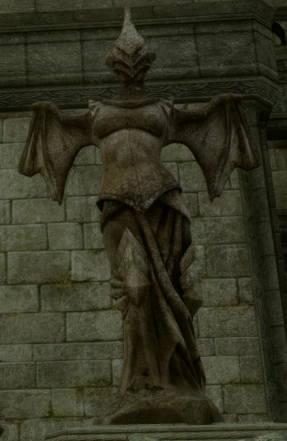
You know what that's based on, and for a long time after it tickles you. Oh, maybe that meant something in the grander scheme of things! We've never seen such a blatant reference to a real-life sculpture anywhere else in game (to my knowledge at the time)! Maybe it'll come up later and it'll all make sense!
Here's the deal. I've been bothered by this for years. The more I think about it, the more angry I become. Anger over a single fucking type of statue, you say? There's a lot of other shit to be angry over in this game, and you choose this?
YES! I CHOOSE THIS! AND THIS IS WHY.
--
Picture this. You're me again, aged 14 this time. You're in the Louvre, the first museum of Western classical art you've ever been to. You've grown up in a place where this interest could only be cultivated from extra-curricular reading, and for a kid that age from my country to be ass deep in Greek and Egyptian myth is frankly lmao. Neurodivergent. Anyway.
So we're wandering around the Louvre, I've just taken my parents through the Egyptian section and given them a thorough infodump on everything I know about burial rites.
And then we enter this room. And I very nearly fall to my knees when I catch sight of her.
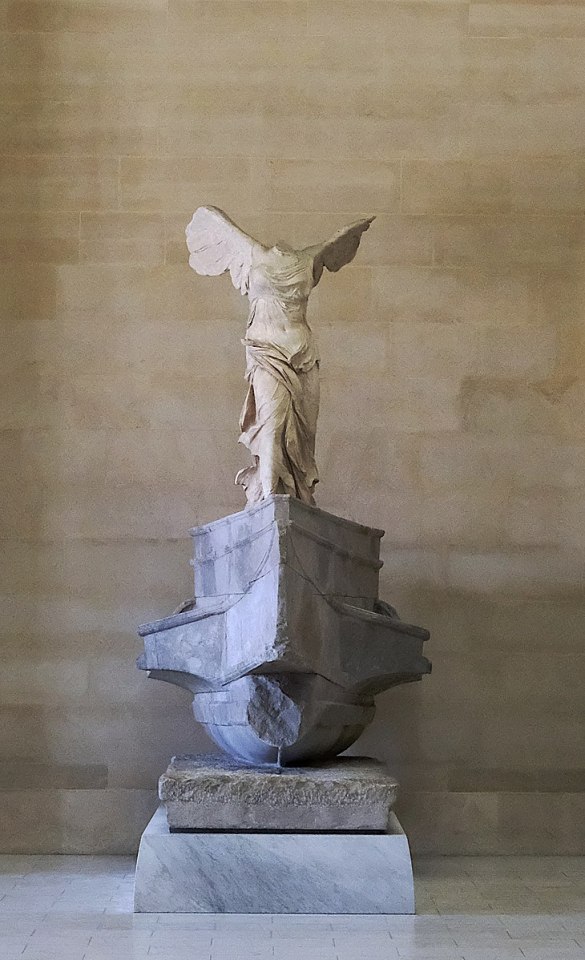
This is the sculpture the statues at the Temple of Mythal are based on - one Winged Victory of Samothrace.
She is a sculpture from the Hellenestic era, depicting the goddess Nike stood at the prow of a ship. Her head and both arms are missing, save one hand with two fingers (also in the Louvre but displayed separately). She was found on the Greek island of Samothrace, among the ruins of what was known as the Sanctuary of the Great Gods. It seemed like she was displayed at the top of a hill, looming down at all that regarded her.
I’ve had the absolute privilege of seeing her in person twice in my life, both before and after the 2013 restoration. And let me tell you, regardless of which staircase that leads you there, the sight of her will stop you in your tracks.

[Now with people, for scale.]
She is massive. Larger than life, and immediately is the centre of your attention. It's not the fact that she has no head, no arms. No, you will realise the closer you get to her, the more you're able to appreciate the details of this absolutely astounding piece of history.
No. It's because she feels so alive.
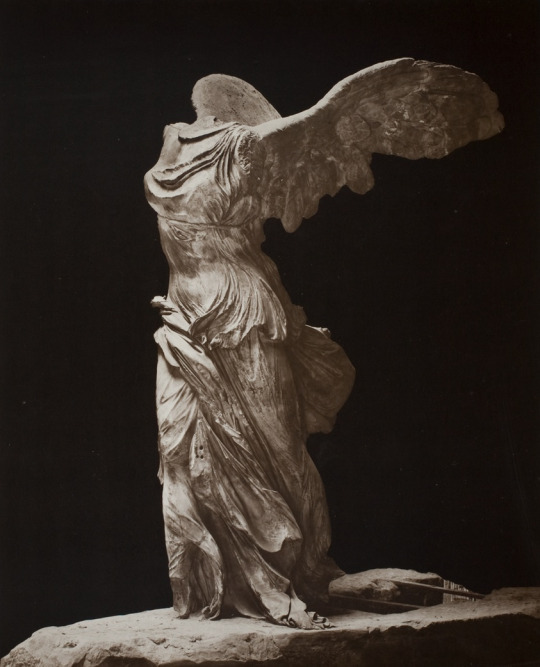
The way her robes drape against flesh, wet from sea-spray or rain, yet flowing with the motion of an invisible wind. The wings cast behind her dramatically as her right foot steps forward. Standing tall and proud, unflinching, unbowed against the elements. Even without her arms, you can feel how dynamic the torso and legs are.
You don't need to be an art historian, or even have any knowledge of Greek myth or art history to stand in front of her, as I once did as a young teen, and nearly be brought to tears.
So.
This brings me to the first of the two main gripes I have with the way this sculpture is used in Inquisition.
Compared to the way she's displayed in the Louvre, and also presumably how she was presented to her original audience - larger than life, looming, powerful, beautiful - she is relegated instead to smaller, repeating statues of the same nature throughout the temple.
This diminishes the purpose of the original sculpture, which was to instill a sense of awe and wonder. The singularity that forces you to focus and appreciate the scale and intricacy. The aura, the gravitas of having a single, massive sculpture of such a dynamic figure is completely gone.
And to make things worse, they Mythal-ify her. Adding a helmed head and changing her beautiful feathered wings to leathery dragon wings. They don't even add arms, which is odd because the original sculpture very clearly is missing its arms.
And, may I ask, Why?
It feels cheap, like they saw the Winged Victory and were like 'oh shit this is a cool sculpture, we should add it in game' without giving any fucking thought to what the sculpture means.
Which brings me to the second gripe. The complete disregard for the symbolism of the Winged Victory.
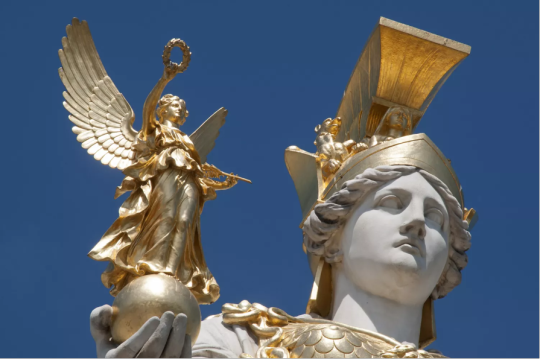
Detail from the Athena fountain, Parliament Building of Vienna, showing Nike the Winged Victory in the palm of Athena's hand [source]
Nike is a minor Greek deity, said to be the daughter of Pallas (a Titan) and the river Styx. Her other siblings by the same parents include Zelus (Zeal), Bia (Might) and Kratos (Strength).
Yes. That Kratos.
She was one of the earliest gods to pledge her allegiance to Zeus in the Titonomachy, and after the victory of the Olympians, Nike and the other gods that allied with them were allowed to live on Olympus. In her aspect as Victory, she is closely associated with several of the major Greek gods, and in particular, Athena.
There's also her Roman counterpart, Victoria. This version doesn't come with the backstory Nike has, but is more of a general concept of victory. This is the aspect that is present in a lot of the modern sculptures and interpretations of Nike/Victoria:
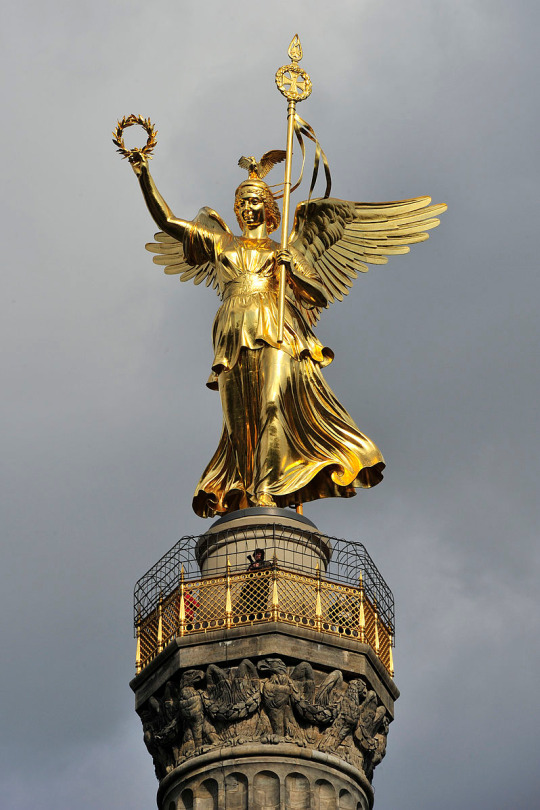
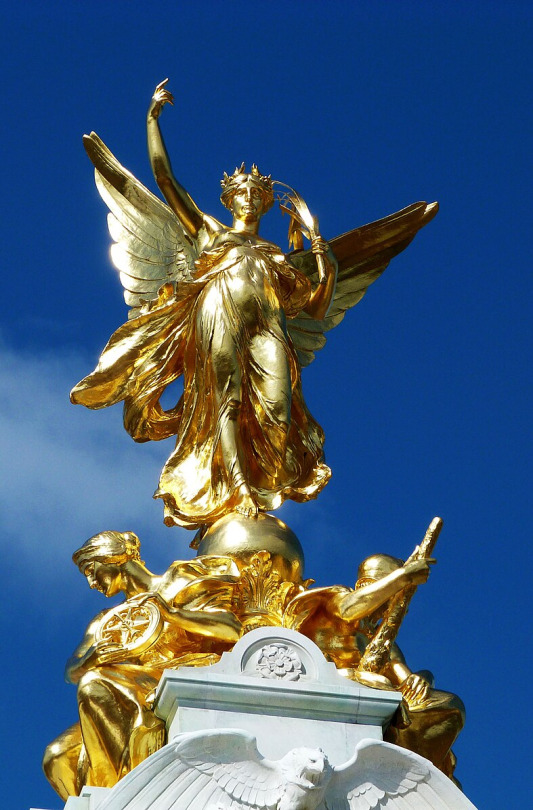
Left: Detail from the Berlin Victory Column. Right: Detail from the Victoria Memorial, London. Note the similar iconography, of a woman seemingly standing against a strong wind, fabric and cloth adhering and yet flowing against the breeze, wings outstretched.
From this, we can probably extrapolate what our beloved Winged Victory might've looked like. Here's an artist's render of one possibility:
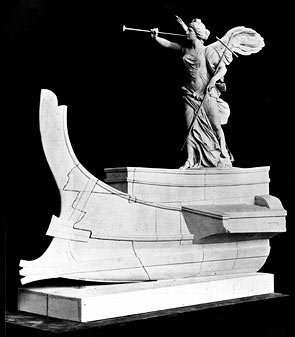
There's some iconography we need to go through before moving on - symbols that are commonly associated with Nike/Victoria.
One is the trumpet as see in the reconstruction above, the sound and symbol of the end of war, of impending peace. Another is the laurel wreath, another Greek symbol of victory and achievement. Famously, laurel wreaths were used to crown victors of the original Olympic games.
This is another conversation entirely, but there’s a discussion to be had about the duality of Elgar’nan and Mythal, in term of vengeance and justice, and how an emotional rage versus a calculated wisdom can be compared to the difference between the two Greek gods of war – Ares and Athena.
If we can compare Mythal to Athena, in the sense of her wisdom in making difficult decisions, then it’s not a stretch to associate Mythal with the symbolism of Nike, and therefore explain the presence of statues similar to the Winged Victory in her temple.
But since Bioware absolutely did not put this in the game for anything other than the Aesthetic, there’s some problems that need to be addressed.
Mainly in the way in which these statues are scattered throughout the temple. If you wanted static, ominous statues to line the walls as your player characters explore, perhaps have like, I dunno. Less dynamic statues that you reference?
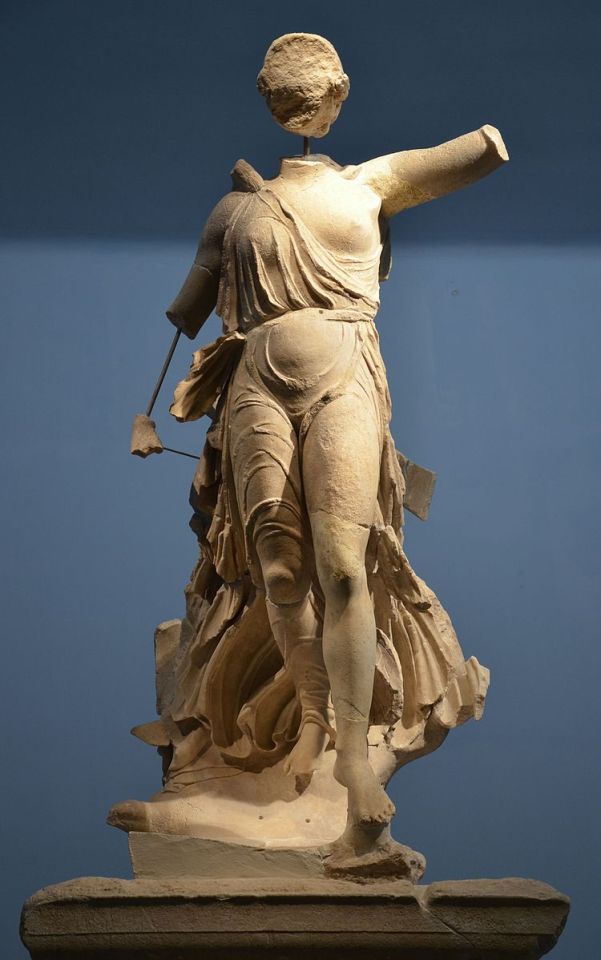
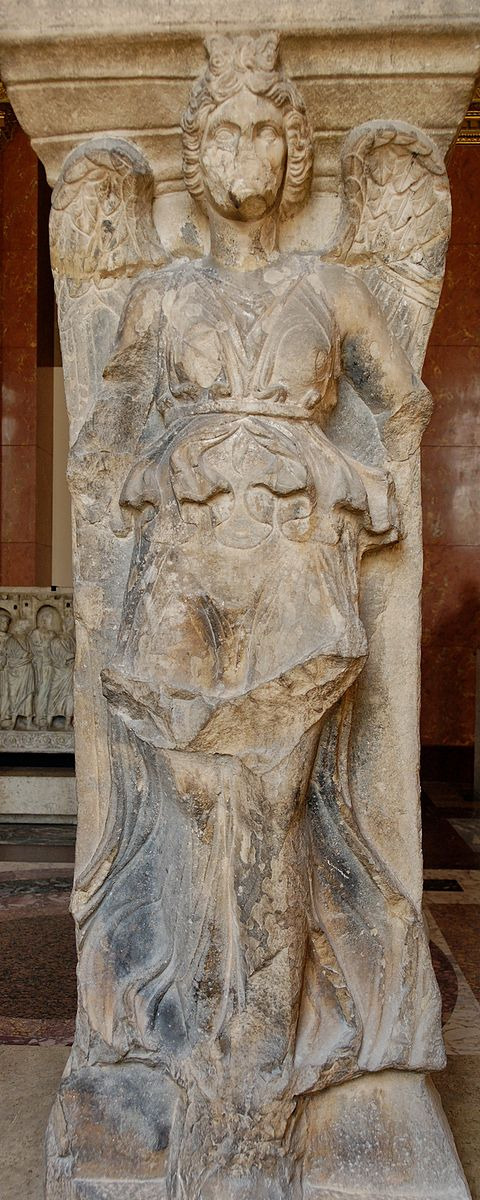
Left: Nike of Paionos, Right: Stele 1 of Las Incantadas
Or maybe instead of statues, have friezes lining the walls. Like this one from the equally iconic Pergamon altar, depicting the Giganomanchy.
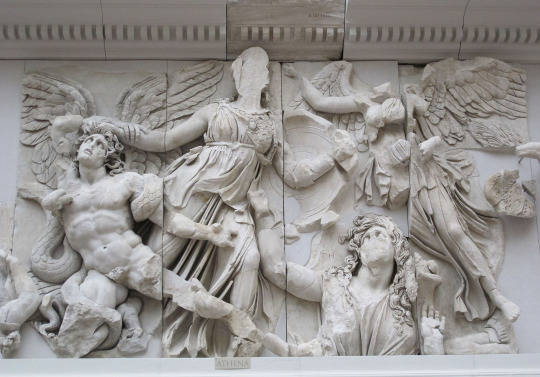
It’s the same symbolism, the wings, the smiting of foes and victory of good over evil.
And then perhaps, at the heart of the temple... where, y'know Bioware, lay a body of water sacred to Mythal herself, you could've perhaps done something remarkable. You could then have had the most dramatic and beautiful entrance you’d ever seen.

[Nike, at the iconic Daru Staircase, the Louvre]
It was at this moment that Mythal walked out of the sea of the earth's tears and onto the land. She placed her hand on Elgar'nan's brow, and at her touch he grew calm and knew that his anger had led him astray.
- Codex entry: Mythal: The Great Protector
Mythal herself strides out of the Well Of Sorrows, the metaphorical tears of her followers that died and kept their knowledge alive in her name. Her (draconic) wings spread out, (restored) hands outstretched to touch her husband, to calm the rage that nearly destroyed this world.
A symbol of victory against the blind rage of a god against His father, the Sun. A symbol of wisdom and grace, against the violence of hatred. A divine sense of something bigger than anything we could imagine.
There's also the lack of iconography regarding victory, instead piling on some cheap representations of what we think of as Mythal. That's another post entirely on the symbolism of the Elven gods, but if Bioware really wanted to hone in on the Athena/Athena Nike parallels, they might have thrown in the trumpet/laurel/palm leaf symbolism with the statues, alongside the dragon wings.
If this were the case, then maybe, just maybe, Inquisition would’ve then earned the use of this sculpture in the game.
Sources not listed above/Further reading if you're interested
https://www.louvre.fr/en/explore/the-palace/a-stairway-to-victory
https://www.worldhistory.org/article/1412/winged-victory-the-nike-of-samothrace/https://smarthistory.org/nike-winged-victory-of-samothrace/
https://smarthistory.org/nike-winged-victory-of-samothrace/
https://www.khanacademy.org/humanities/ancient-art-civilizations/greek-art/hellenistic/a/nike-winged-victory-of-samothrace
#da lore#da meta#mythal#temple of mythal#dragon age#da lore and meta#yo this has been simmering and brewing in my brain for like 8 years now not kidding#and im already neck deep in like..... figuring out the evanuris and trying to tie them into real world mythology and thats super fun too!!!#watch as this consumes and destroys me#my writing
130 notes
·
View notes
Text
Anders and the Blooming Rose
It’s a fairly minor part of his character, but I find it hilarious that Anders, "The Healer” of Darktown, really does not like the local brothel. If you take him with you while purchasing “services” from Madame Lusine, you get this reaction...
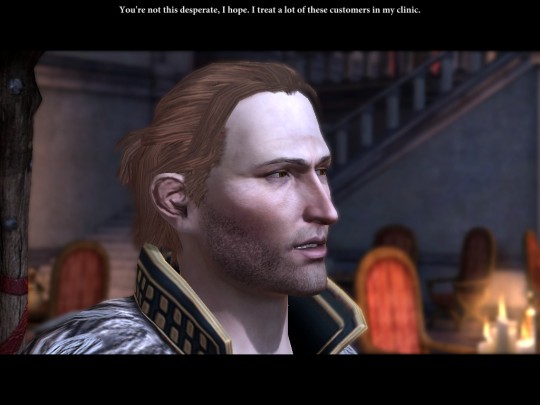
“You’re not this desperate, I hope. I treat a lot of these customers in my clinic.”
Then if you ignore the warning and do it anyways (you know, because Hawke)…
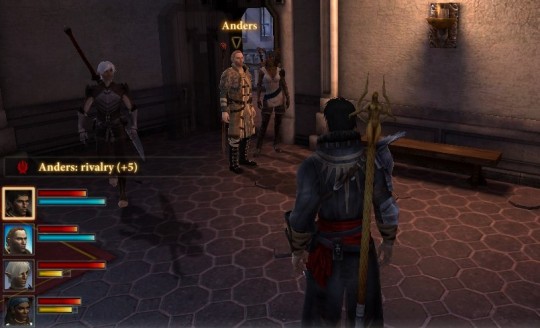
Anders: rivalry +5
It’s not a moral condemnation, a complaint about wasting time (à la Beth or Carver), or a vague expression of disgust (of the sort Fenris or Merrill reply with) — Anders, the closest in-universe equivalent to a doctor, is warning the player-character away from soliciting prostitutes on health grounds.
One interesting aspect of Dragon Age II is that it contains many more specific references to disease — which makes sense, given the medieval urban setting, where the top causes of mortality would realistically be infectious disease. Gamlen explicitly refers to his parents dying of “cholera,” a highly lethal (even today, untreated cholera has a case fatality rate of up to 50%) water-borne illness, and the water supply in Lowtown is described as dangerously contaminated (Hawke can refuse to drink it “even on a dare,” Merrill refers to something “twitching” in the water even after boiling it). A random NPC asking Lirene about “The Healer” complains, “I can't get my brother off the boat. The grippe's [i.e., the flu] got him bad.” Then there are the multiple references to unspecified STIs, all of which come from (or at least are associated with) Anders.
There’s an amusing line from Anders upon entering the Blooming Rose for the first time (usually but not necessarily during Enemies Among Us in Act 1):

“If someone tries to hire me again, I’m leaving.”
Now, some fans seem to read this as a claim that the Blooming Rose has tried to hire him as a sex worker, but I believe there’s a more plausible interpretation here. (Frankly, I have difficulty imagining that a brothel would be obsessed to the point of harassment with recruiting as their newest rent boy a man in his mid-30’s — and one who, need I remind you, lives in a mine shaft connected to a sewer and notorious for its toxic fumes, dumping of rotting corpses, and disease outbreaks. And no offense to any Andersmancer reading this, but is he really that good-looking?).
Most likely, the brothel is looking to hire an in-house physician (or Thedosian equivalent). Anders is referred to curing STIs and providing other reproductive care. In introducing him, Lirene says, “He's closed their wounds, delivered their children.” One of patients in her shop can be heard crying out, “My mother's in labor! The baby's come early. Can anyone help her?” To which Lirene replies, “I'll send word to the healer.” (Anders may have been delivering babies back in the Circle as well, considering that in MoTA, he says, “At the Circle, any accidental babies are taken away before the mother even sees them.” This could, however, simply be common knowledge among Circle mages). It’s also implied by Wynne that Circle mages practice contraception: “Such births [in the Circle] are seldom, as there are ways to prevent it, but it does happen.” Moreover, Anders appears to be the only person in Kirkwall willing and able to provide these medical services. There are references to useless quacks (e.g., “some purveyor of hensbane and leeches”), but it’s acknowledged in-universe that the only effective healing comes from mages. In DAI, the Inquisitor can express surprise at the presence of a “mundane” (non-mage) surgeon, who goes on to insist that such non-magical methods will be developed in the future, all of which further reinforces the (in-universe) social/cultural equation of healer as mage. Mage healers only appear to be let out of the Circle on rare occasions to treat members of the nobility, but ordinary people don’t receive such consideration. Even the viscount’s seneschal has to seek out Anders for help. In DAI, Cullen casually moons the idea of “healers’ clinics with templar support” (among other potential “opportunities to work outside the Circle”) as a totally novel solution to mage “resentment” over confinement. The Chantry thus far wasn’t willing to release mages to treat sick commoners even with phylacteries to deter escapes and Templar overseers breathing down their necks the entire time; in fact, they were rather reluctant to let out even a handful of senior mages to fight alongside the king against the Blight, something which threatened everyone’s lives fairly equally (and even then couldn’t resist the temptation to make the mages feel as unwelcome as possible). “The Healer of Darktown” was well-known to illicitly (that is, in defiance of Chantry restrictions) provide health care for free to the masses, and this service not surprisingly had earned him quite the number of admirers and defenders. Lirene resists being threatened for information about him by saying, “Any Fereldan in the city would lay down his life for the healer, after what he's done for us,” and a mob of Ferelden refugees even prepare to attack the heavily-armed party out of fear that the latter might harm him or report him to the Templars. His Act 2 Codex likewise reads: “When not with the Champion, he spends his time among the Fereldan refugees in Darktown, healing their ills and counting on their loyalty to protect him from curious templars.” Should it be a surprise then that a private business might be interested in his skills, especially when disease is threatening their bottom line and injuring customers?
In the game, we actually see two frequent patrons of the Blooming Rose end up in Anders’s clinic for treatment.
Dissent (Act 2), if Isabela has been left behind:
Anders: ...don't come running to me next time you pick up one of these diseases.
Isabela: Isn't that the point of magic?
Hawke: I don't want to know.
Dissent (Act 2), if Isabela is in the party:
Seneschal Bran: And that will, ah, stop the itch?
Anders: Yes. Though I would stay away from women you meet in the port. Pirates tend to... dock in unsavory places.
Isabela: I heard that!
Anders: Just use the salve if it comes back.
This is probably also what Isabela is referring to in the opening to Speak to Fenris (Act 2):
Isabela: So the seneschal's tax collector won't be coming around again, like you asked. Funny story.
Fenris: I'll pass, but thank you for the help.
Isabela: Spoilsport.
Seneschal Bran appears to be a regular with a particular fondness for Serendipity, a drag queen (or transfemme?) and one of the highest-paid workers at the Blooming Rose, whose gender nonconformity is generally Played for Laughs. Bran can be seen on a “date” with her at Duke Prosper’s party during Mark of the Assassin, and Serendipity can later be heard commenting, “I haven't seen the seneschal much lately. Don't tell me the man's gone religious” (to which someone responds, “No, he just keeps terrible hours now”).
Isabela, of course, talks about sex and her enjoyment of brothels (including the Blooming Rose) quite frequently. In Dragon Age Origins, we meet her dueling two men at The Pearl (Denerim’s main brothel), and she can (in)famously be talked into a threesome or foursome with the Warden and their LI, although in that game it was unclear whether she was hiring prostitutes or simply ended up there in the course of searching for dueling partners (given that the building had been occupied by mercenaries, and one of the optional quests in Denerim is to clear The Pearl of disruptive mercenaries on behalf of the city guard) or following/checking on her crewmen. In DA2, it is confirmed that she was going to The Pearl for sex, and Anders remarks, “You used to really like that girl with the griffon tattoos, right?” to which Isabela replies with the name “The Lay Warden.”
(For now, I’ll just ignore the unfortunate implications of Bioware depicting a promiscuous black woman repeatedly contracting STIs and unrepentantly spreading them to white men for blackmail purposes. But yeah, yikes).
Historically, the emergence of STIs as a major social problem has been associated with urbanization and military mobilizations — basically, situations in which large numbers of individuals had opportunities for unprotected sex, especially with multiple partners, away from the usual social control mechanisms such as cockblocking parents (and virtually all sex was unprotected until latex condoms began to be mass-produced in the 1920s-30s). Without the safety measures we have in place in licensed brothels today (e.g., condom requirements, regular STI testing), brothels and red light districts were superspreader bonanzas, and perhaps unsurprisingly, medical professionals tended to take a rather dim view of them, to put it mildly. Modern readers often historical interpret opposition to brothels and camp followers (in the military) on the part of medical and public health authorities as expressions of prudery, religious conservatism, and/or misogyny, and to be frank, they very often were. Yet at the same time, in the pre-condom and pre-antibiotic era, STIs represented a major public health burden and cause of disability, disfigurement, infertility, and premature death, and there few practical measures beyond simply urging everyone to keep their pants on (which worked about as well as one might expect).
Circling back to Anders, it's notable that he takes a much more negative view of sex in the second game than in Awakening, during which he seemed eager to hump anything that moved. This could at least in part reflect the influence of Justice, who seems to regard anything other than fighting for justice and engaging in public service to be "selfish" and even slothful (as in demon-y sloth). Or simple aging and maturity. Or, on a meta level, it could be an odd re-characterization due to the change in writer. But I like to think that his newfound discomfort with no-strings-attached boning is an unfortunate side effect of being a charity doctor working into the late hours to accommodate an endless stream of dick wart patients. It's already a shame that his clinic and service for the poor is relegated to such a background element, especially given the role such work would realistically play in forming a person's character. In terms of character development, it would have been interesting to explore how his work in the clinic could itself had a radicalizing effect — after all, it would bring him face-to-face with the tragic consequences of Chantry policy on mundanes (rather than just mages) as well as demonstrate magic’s contribution to the greater good on a daily basis. But this angle unfortunately never comes up in-universe.
TL;DR What I'm actually saying is that the real tragedy of Anders's character arc is the profound decrease in sluttiness between the two games.
#dragon age#dragon age 2#dragon age meta#anders#anders*#anders dragon age#da meta#dragon age ii#da2#dragon age awakening#justice#spirit of justice#the blooming rose#isabela#Isabela dragon age#isabela rivaini#seneschal bran#serendipity#fenris#madame lusine#sti#std#disease#history of disease#100#200#300
448 notes
·
View notes
Text
I'm never surprised to learn when writers don't put much thought into things but honestly Alistair and Morrigan being straight-locked makes complete sense to me.
The Chantry is very clearly meant to mirror the Catholic Church and, via banter between Alistair and Wynne, shown (despite Word of God and Doylist explanations) to be sexually conservative; Alistair not considering men as an option full-stop makes complete sense considering he was, in his words, "raised in a monastery" from the age of like eight (or ten? Not looking it up).
Flemeth deliberately raised Morrigan in a swamp, almost entirely away from people, and only ever lured men into her clutches; Morrigan herself admits that she doesn't know hardly anything about socially acceptable behaviors across the board and so, similarly to Alistair, I wouldn't be surprised if interest in women simply never occurred to her.
Conversely, Leliana was a bard and already had Marjolaine as a lover by the time we meet her, and Zevran was a Crow who engaged in sex work when considered necessary and his last relationship was a throuple with a woman and another man.
I'm not saying that it's, like, the only objectively correct conclusion that Alistair and Morrigan are straight. I'm just saying it does make sense for their characters' specific backgrounds, especially given how easy it is to interpret both as autistic. Like I can't speak for all autistics everywhere but I certainly can't invent concepts whole cloth without ever hearing about something similar as a starting point.
All this to say: same-gender Wardens who romance the bi same-gender companions are definitely Alistair/Morrigan's bi awakenings.
#dragon age: origins#alistair theirin#morrigan#da meta#by apples#at least cassandra specifically and explicitly EXPLAINS that she's flattered but Very Straight#afaik you just can't flirt with blackwall OR solas at ALL if you're a dude (and of course with Le Egg only if you're an elf)#(like i get that with solas they were hamfistedly TRYING to avoid the Evil Bisexual trope but like. give him a Straight Scene like cass!)
65 notes
·
View notes
Text
one of those things that's really striking and interesting to me is how often it's simply not addressed when discussing low approval Solas + inquisitor that Solas is, in many ways, acting out his role as the fantasy trickster god. he comes to you in a very humble format; an apostate mage elf, which in the social dynamic puts him veeeeery low on the podium. one of the first things he does in his first conversation is address the fact that HOPEFULLY, the Inquisition will remember who helped, and who did not -- because it is a very real possibility, again, in the context of the social dynamic, for him to be fucked over supremely by the inquisition -- to put him back into a circle, etc. once it's over. of course, Solas knows, and we the player know, that this will never happen, because he's Fen'Harel and such and such. but when interacting with him IN GAME? that social dynamic is vital to understanding why Solas acts the way he does around you. it's fairly easy to rack up approval--simply make the effort to consider a perspective other than your own, a perspective from someone who society has deemed very low (elven mage). slam him down and be belligerent? it only confirms that the leadership here is rooted once again in power hungry individuals who will step on the lowest classes for their own gain.
it's quite literally... fantasy trickster god testing the hero to see if they will treat the humblest person with kindness, or need to learn the error of their arrogance. solas APPROVES almost entirely of things that promote elven and mage freedom, helping the needy, freeing those who need freeing, not playing into being an arrogant leader. when you punch him, in the social dynamic, you are exerted an abuse of power and authority that now goes beyond the verbal, into the physical. could HE, if he were a simple elven mage, defend himself? no. because an elven mage hitting the leader of a holy army back could have him be put to the death. none of this excuses Solas' own flaws, his faulty reasons for his actions, etc. but like, taking into consideration the actual social structure of the game and what kind of power dynamics are going on here, it's necessary to UNDERSTAND the character and what kind of choice you make here, and how it all informs Solas' idea that either 1. he's wrong, this world has things worth saving, but he cannot diverge from his course, even if he on some level wants to be stopped, or 2. this world is just as terrible as the one he left behind, and it needs to be undone.
390 notes
·
View notes
Text
anders & merrill parallels
despite coming from contrasting walks of life, anders and merrill have a lot in common. tension rises between them due to fundamental differences in their belief systems; things that could help them understand each other incredibly well mostly just drive them apart, which is such a tragic loss for two people who are in desperate need of support.
ways anders and merrill parallel each other:
childhood displacement and resulting isolation
on a quest for the good of their people
their faith
association with spirits/demons
lack of support and eventual tragedy
childhood displacement and resulting isolation:
at the age of 12, anders was taken from his parents to the ferelden circle. when merrill's magic manifested as a child, she was sent to another dalish clan that needed a keeper's first, having to leave her parents behind. their magic meant they had to be uprooted from their homes and families. merrill's displacement was not done maliciously--mages are moved around so that no clan goes without a keeper to preserve their history and culture--but it does still mean she lost her family very young and only has vague, wistful memories of them.
marethari, as much as she thinks she's doing what she must / what's best for merrill, is not a good parental substitute. their relationship may have started decently, until the matter of the eluvian drives a wedge between them, but what happens at this point doesn't paint marethari as a good parental figure. marethari chooses to send merrill away rather than trying to reach a compromise with her, or even just comforting her and helping her process her grief in a healthy way. it's clear merrill thinks of marethari highly, but it seems like acceptance and emotional support may not have been a large part of their relationship. in addition to this, as a keeper's first, merrill's training and apprenticeship likely took most of her time, making it harder to nurture other friendships.
likewise, the circles aren't a good place for mages to form relationships. they're under constant scrutiny, they have to be careful about any connections they form, many mages may feel they're safer keeping to themselves. children born to mages in a circle are even taken away from them. circles are a hostile environment in many ways, and wouldn't inspire the mages to foster companionship. anders refuses to talk to anyone, even the other mages, at first. he escapes seven times. it isn't until karl that he has any reason to stay, and then karl is taken from him, too.
both anders and merrill have the people they care about taken from them repeatedly--and in merrill's case, the people she cares about even push her away. they grow up disconnected, isolated, and having to fend for themselves. i think this leads to some of the personality traits they have in common as well, namely their intense stubbornness. they have learned that they're largely on their own, so they make decisions on their own, and can rarely be swayed once their minds are made up.
on a quest for the good of their people:
anders is fighting for mage freedom--eventually at all costs. merrill is determined to restore her people's history--not necessarily at all costs, but she goes far further than anyone else would. both of them are driven by wanting better for their people. they are passionate about their goals. these goals are at the forefront of their lives, they are goals they strive for across years, relentlessly. they don't give up, no matter the difficulties along the way. they desperately want positive change for their people. their goals say a lot about them as people, and these qualities are things they share with each other in an incredibly synonymous way.
their faith:
anders is andrastian, and merrill believes in the creators. anders' faith doesn't come across so strongly, because he is of course opposing the chantry's rule on how mages should be treated, but the chantry's teachings have been ingrained in him since growing up in the circle. he believes that there are spirits, and there are demons, and the demons are wholly, inherently evil. his understanding of justice supports his understanding of this dichotomy. merrill, by contrast, was taught that all spirits/demons are just like people, as varied as any mortal. she says all of them can be dangerous, but they can be helpful, too, and she is confident in her ability to treat them carefully and safely.
they butt heads on this badly. anders asks if merrill started blood magic by accident. she says no, she did it very intentionally. anders asks if maybe she just doesn't understand the difference between spirits and demons. she says no, i have a belief of my own and don't need to borrow yours, thank you. it's inevitable that you'll become an abomination, anders claims. skill issue, merrill replies.
their faiths are different, but the two of them are similar in how strong their belief is. it's that stubbornness again: they will not be swayed. they can't agree on blood magic, or how to view demons, which is the main thing that keeps forcing them apart despite how similar they are.
association with spirits and demons:
on the topic of their different perspectives on spirits and demons, another main thing they have in common is anders' relationship with justice, and merrill's relationship with demons she communicates with through blood magic. anders doesn't appreciate them being compared in this manner, but from merrill's viewpoint, they are very much comparable, and in fact, anders is doing the same thing she does, but far riskier. she has no intention of ever joining with a demon. she says anders has no room to judge her, when he has let a spirit in.
both of them are willing to communicate with spirits, both of them have a more open-minded approach to spirits, and this is something they could find common ground on, if not for anders seeing a difference between spirits and demons while merrill does not, and anders' belief that he has corrupted justice into vengeance. it doesn't matter who is right, if either of them are. both of them are doing something risky but thought/think they have a handle on it, that they could/can control it.
whether or not they're right, it leads them to tragedy regardless.
lack of support and eventual tragedy:
merrill is right that she can fix the eluvian. she's also right that eluvians were important artefacts to the elvhen and they could teach the dalish more about their history. she's right! and it doesn't matter. no one believes her. everyone thinks she'll only bring them destruction. her clan turns her away when she refuses to back down. even hawke can not believe in her. many of the other party members don't believe in her. she's right, and it doesn't matter. her clan has a high chance to end up dead. she loses marethari regardless. many party members comment on the fallout in harsh ways. the guilt is already eating at her. she fixes the eluvian, and there may be no one left to share in her success, she may not even be able to feel victorious herself, after what it cost. she is alone. she has always been, in some way, alone.
how different could it have been, if someone had understood what she needed? if someone had as much faith in her as she had in herself?
anders lived the experience of a young mage ripped away from their home and family, forced into a circle, forced under templar and chantry rule. he knows what it feels like to be a lost, scared child, locked in an unfamiliar place, where armoured figures with hidden faces are always watching. he has experienced the abuses. he has been imprisoned and tortured. he has had people dear to him taken from him and made tranquil, even though they were harrowed, even though they never would have done something to warrant it. until joining the wardens, his life was an endless battle to just be free.
the fight for mage freedom, and his manifesto, are a matter of life and death for anders. everyone else, though--they can ignore it, because it doesn't impact them directly. they can believe the potential for mages to be dangerous justifies systematic abuse and even culling. anders is frequently ignored, belittled, or even hated for his mere desire for freedom, and for his passion for the freedom of all mages. he is screaming at the top of his lungs, and no one is listening.
in the end, no matter what, he blows up the chantry alone. he's out of options. it's been years, and nothing else works. no one cares. he has been pushed to his limit. he doesn't want it to be like this, but it's all there is left, and something has to give. he does this alone, and is willing to give his life in the aftermath, because he has nothing left to give.
this likely never could have gone differently. anders has been doomed since the moment he was born a mage.
conclusion:
anders and merrill are characters whose lives often mirror each other: mages who have never been able to form strong, healthy, and/or lasting relationships, finding themselves isolated and needing to rely on only themselves. they are deeply passionate people who strive to do good and make a difference. unfortunately, this works out tragically for both of them.
in a perfect world, maybe they could have been exactly what the other needed. their empathy and determination could have let them help each other. the base is there: when anders first starts asking about merrill's blood magic, he does it with a tone of concern. many times, merrill can express her wish for anders to be happy. in a conversation with sebastian, merrill reveals that anders has warned her to stay away from the chantry. they disagree with each other, but they do care. at anders' harshest, he is talking about himself more than he's talking about merrill; as he feels himself fraying, he projects his anger at himself onto her. he sees their similarities, and he's afraid. she could have reassured him, they could have supported each other, could have put their heads together and found new solutions. the potential was there for their similar experiences to give them a uniquely strong companionship, but they just never managed to grasp onto it.
#dragon age#da2#anders#merrill#da meta#can you tell..... i adore them both so#slacking off on nanowrimo to write this goddamn essay of a post#my meta
61 notes
·
View notes
Text
There ARE valid arguments to be made about "playersexuality," especially if a character is written/heavily implied to be gay/lesbian but given a straight romance. That specfic scenario isn't something I'll get into in depth right now to make this as brief as possible, but "it's ridiculous that every character is bisexual" is NOT one of those arguments. I saw it for Dragon Age 2, and I am annoyed but not surprised to see it for Baldur's Gate 3.
This will feature reclaimed use of the word queer. Tagged below, but thought it might be good to mention.
Dragon Age as a franchise is significantly less committed to queerness than BG3. Thedas was built, intentionally or otherwise, to be heteronormative and gender conforming. To a lesser extent than real life, in that same-sex attraction in Thedas is generally considered unremarkable, but oppression and othering of queer people in-universe DOES exist and it isn't hard to find. (The biggest examples: Dorian's experiences in the upper-class Imperium, the framing of Krem's trans-ness as uncommon or atypical). And DESPITE that, the bisexuality of DA2's main cast does not feel forced or ingenuine to me. The party doesn't remark on or make political statements about each other's sexuality. Sexuality is, at least to this group of people, entirely apolitical, and they all just happen to be a similar sort of queer.
PLEASE consider, then, a world built entirely void of the widespread social culture surrounding sexuality, as Baldur's Gate 3 has tried to create. Where bi or pansexuality is the "common" or "expected" orientation, or more appropriately, where the concept of orientation is absent entirely. This person just cares about personality in who they date, this one doesn't really want to date anybody, this one wants to be in a polycule, and those are all completely neutral positions to hold and inconsequential to their greater character as an individual.
In this world you could easily pluck a half dozen or so random people out from the millions and find that they all desire sex and/or intimacy with any gender equally. If there's no erasure of queerness, it follows that open queerness is more abundant. Sexuality is fluid and various as gender is fluid and various and neither are reflections of someone's personality or morals. Being gay doesn't make you effeminate because there's no preconceived notion that straightness is manly, etc etc.
That's all true in the real world of course, but the difference is that it feels like Larian has tried to craft their narrative around it being the cultural norm. YOU might think it'd be ridiculous for a half dozen random people to be bisexual, if you haven't spent the time in queer spaces to learn that there are gay people everywhere. Even if you have, and there are more queer people in your life than straight ones, you might think it'd be unlikely to pick 6-8ish random people on Earth and find that they're all specifically bi or pansexual. You may even be right, because all over the world there are restrictive dominating cultural narratives that alienate, suppress, and persecute queerness. BG3 doesn't take place on Earth, though, does it? So sit down and think about it for a minute, please.
Of course there'd still be variation. You'd find people that fit the definition of straight or gay or asexual, but there's no expectation of straightness. Sexuality simply is. If you're interested in somebody, either they're interested back or they're not. You find out, you move on. Githyanki even reproduce asexually, so they don't have any flimsy biological reason for straightness, though if you're resorting to "biology" to debate sexuality, you're too far down the pipeline to have read this far anyway. Lae'zel wants a warrior, not a man. You might happen to be both, but it's not your gender she's lusting over.
Also, bisexual men deserve to exist freely without you policing exactly how gay or straight they get to "act." And you aren't somehow less biphobic for invalidating them just because you yourself are gay, so don't think that absolves you. Yes this is about Astarion. He's a bit more overtly queer-coded than Gale or Wyll. He's not gay. Bisexual men are evidently only valid to you if they "act straight." Fuck off.
Gay people exist! Let's put that lukewarm take to rest now, please. If gay people live in a culture that allows them to exist, they exist in much greater abundance. Who would've thought? Left-handedness over time graph my love. The single greatest refutation to Straight People Whining.
Look, you can just say that you're jealous you aren't in an all-bisexual friend group. It's okay. All-bisexual friend groups are awesome.
#yup!! no follow-up notes#said what i had to say#oh and i'm left handed#i love bragging about it#and queer/bisexual obviously but i think you could tell#bg3 meta#da meta#baldurs gate meta#dragon age meta#queer#dragon age#baldurs gate 3#bg3#fandom critical
96 notes
·
View notes
Text
It's 5 in the morning right now and I should be sleeping but I got to thinking about Qunari and how they're most likely elves with dragon blood mixed in. How that most likely means that mad scientist Ghilan'nain was involved. How that means the kossith are most likely ANCIENT ELVES. No wonder Solas hates them so much, he can barely stand modern, mortal elves, and that was HIS fault! Imagine how he feels looking at an entire race of elves that have been so corrupted and changed, then on top of that, made slaves of the Qun? How the Qunari, who famously hate and fear magic, have had their history of the kossith wiped from their records and memories because they came from a once entirely magic race? How have I never connected these dots before?!?
#I'm probably not the first to have these thoughts#I could always be wrong too#BUT IT FITS TOGETHER TOO WELL DAMN IT#dragon age#dragon age: origins#dragon age 2#dragon age inquisition#dragon age 4#Qunari#solas#kossith#Ghilan'nain#dragon age theory#dragon age theories#dragon age meta#da theory#da meta
208 notes
·
View notes
Text
also... dude... Inquisition did the darkspawn dirty
they’re just lazy sleepy skeletal annoyances easily struck down in Inquisition but holy shit they’re not just scary in Origins they’re downright disturbing
like... not just visually (which dai also dropped the ball on imo) but the fact that they eat their victims and not just kill them, drag them underground (Morrigan says she doesn’t know what for but like the implications are kind of teriffyingly clear), and that they string up and place bodyparts around like frickin decor
78 notes
·
View notes
Text
God to put in the perspective of Solas and waking up to a world you do not recognize and there's this Dalish that somehow manages to intrigue you, but think about it 1000 years is like 5 years Solas' time, how inquisition was mere SECONDS in his long life and how easily he was at Lavellans feet, how one kiss changed his whole trajectory of his life, how one small romance for people who didn't even matter to him, almost made him throw away his ENTIRE life's work. And knowing that even in mere seconds or a week in Elvhen time made Solas realize what he was truly missing and how he comes to regret it! The regret spirit even says that he regrets using and betraying his FRIENDS. A WEEK. IN ELVHEN TIMES and he considers these people his FRIENDS.
Then how that will parallel Lavellan, 10 years is their 1000 years, how a Lavellan will be where Solas was at the beginning of inquisition, afraid to kiss, afraid to trust, afraid of the betrayal they feel will come, just afraid. But this time (with the protagonist's help) Solas reaches out to her, shows her what he's hidden, and shows her the deepest memories he has just to gain back her trust. How he will most likely lay himself down once more to her, let her take control. He will be gentle because he knows that's what he needed long ago.
126 notes
·
View notes
Text
Thinking about the mage rebellion and Fereldan. My main Warden is a Surana that sticks Alistair with the throne so I never really gave it much thought about why Ferelden's ruler would accept the rebellion.
But I replayed and something stuck out to me: Connor was frustrated about them being in Redcliffe. He asks how that could be seen to be a good idea. And honestly? Given that the Wardens rule Amaranthine and it's a major point of entry from the sea it wouldn't be that hard to have set Fiona's people there and gotten fewer side eyes by the locals. They're used to Wardens, mages ain't that weird in comparison. Especially after the Warden-Commander let a possessed corpse follow them home from the swamp like a lost mabari.
But Ferelden has a population problem. Lots of dead young men and women just at Ostagar, let alone the southern hills, the bannorn via the rebellion, and Denerim. And the survivors of the Siege at Denerim would have had high chances of Blight Sicknesses, there were probably epidemics following 9:31. That would have crippled the fighting population. That doesn't even count that a lot of the refugees who made it to the Marches and elsewhere never returned.
Redcliffe is the fortified gateway to Ferelden from the /Orlesian/ border. The same Orlais that certain powers (Gaspard) want to return to being an expanding empire.
Celene's hold was weak. Weak enough the Inquisitor could arrange to break it entirely.
The Chantry is primarily Orlesian and that would give the mages a reason to not want Orlesian control if it came down to Gaspard as Emperor bringing chevaliers back across the Frostbacks.
I don't think Ferelden took the mages in out of generosity. At least not entirely. I think they saw a chance to add a significant military force to their country if their gamble paid off - and that's why Teagan agreed. Unfortunately for the rebellion the Tevinter thing is a definite point of no return - the mages weren't loyal enough to their own cause, to where they were, to continue the risk of keeping them.
#dragon age#ferelden#mage rebellion#DA meta#my own thoughts#dragon age: inquisition#i havent slept#please forgive any typos
31 notes
·
View notes
Text
Exploring the missed potential of Anders' character
Anders was an interesting character with a backstory and a set of characteristics that would have been amazing if explored further, but I believe his character's potential was tragically squandered by bad narrative choices and poor writing.
Here's a list of how I think his narrative potential hadn't been fully explored:
His name really isn't "Anders" -- it was a name given to him when he arrived at the circle at age 12 and was so traumatized he refused to speak, not even to say his name. BioWare has never revealed Anders' birth name. We also know that he has Anderfels heritage on his father's side, who migrated to Ferelden as a boy. It could have been revealed, through his birth name, that he has some connection to an Anderfels-related plotline: he could be related to the First Warden, or his family could have prominence or influence in the Grey Wardens of Weisshaupt.
Anders is a mage, a Grey Warden, and a host to a Spirit of Justice. This combination of spirit healing (already a rare branch of magic), Blight magic, and a connection to a Spirit of the Fade has never occurred before in known canon. Anders being connected to the mages, the Circle, the Grey Wardens, the darkspawn, and Fade Spirits means that there is a whole world of possibilities to explore with that combination, so many things you could do with his character.
Leveraging off Anders' connection with Justice, a potential key to finding the cure for the Calling could have involved possession by a Fade Spirit. (We already know Fade Spirits are essential to curing Tranquility -- perhaps there's more we could do with that.)
Anders could potentially be a companion to both the Hero of Ferelden and the Champion of Kirkwall, depending on your World State. If your HoF didn't die during the Archdemon battle and continued to Amaranthine, Anders (together with Justice) is the only NPC companion who has traveled with both the HoF and Hawke, and is also a potential love interest to Hawke. (Zevran and Isabela also are NPCs acquainted with both the HoF and Hawke, but only Anders has been a party companion for both.)
Anders could potentially be the only known Grey Warden to have met both the Architect and Corypheus.
Anders could have potentially have battled demons in the Fade three times: his Harrrowing, the Blackmarsh sequence in DA Awakening, and the "Night Terrors" Feynriel rescue mission in DA2. Considering these experiences, plus the fact he has his own in-built Spirit GPS in the form of Justice to help him navigate the Fade, Anders has the highest potential to be the one to rescue Hawke/Stroud/Loghain/Alistair from the Fade (if left there in DAI and has the potential to be rescued).
Anders may have political connections to the throne of Ferelden, if Alistair was made King, and was present at and endorsed Anders' conscription into the Wardens.
If your Warden was Mahariel, Anders would have a common connection with Merrill. If your Warden was Amell, Anders could have an extra connection to Hawke, having known their relative. A Warden Amell or Surana could also have an added layer of their relationship with Anders, having grown up in the same Circle together. (Anders just has a lot of connections to famous people and an extensive network that would have made everyone on LinkedIn jealous, is what I'm sayin 😆)
Anders being a prominent figure in the mage rebellion could also have been explored further -- especially in relations to Fiona, who was coincidentally another mage advocating for mage freedom and with a connection to the Grey Wardens and Alistair.
I just think it's tragic that Anders had so much potential -- arguably one of the characters with the most potential in the overall plot -- and yet BioWare squandered all that potential to push their brand of "grey morality".
The narrative and writing could have framed Anders as a heroic character -- it would have been so easy, the chances were right there -- which would have opened up the chance to explore the potential of his character further in subsequent works, but instead in DAI, BioWare doubled down on slandering his character to drive the point home that he was a villain, and closing off further exploration of his character post DA2.
#anders#anders dragon age#anders da2#dragon age 2#dragon age meta#da meta#bioware critical#jennifer hepler critical#mage rights#pro mage#anders positivity#anders is protagonist material#my meta#anders meta
892 notes
·
View notes
Text
Something I haven't seen discussed about Act 3 is that the mages being violently oppressed and the Circle about to be annulled weren't the only problems. The Chantry via the Templars was actively preventing a new Viscount from being elected (and had power over the previous one). The Kirkwall Chantry, which is a branch of a foreign power structure and has nothing to do with the running of a country/state was preventing the legal political proceedings and that way they run Kirkwall themselves even more than before. Meredith was pretty much running a martial law with neither a good reason nor legal authority to do so, and was on her way to full dictatorship.
So yeah, the Chantry had it coming. Violent outcome was inevitable bc the Chantry made it so. Meredith was unhinged and Elthina washed her hands of her while retaining her own image of being innocent.
The problem is some people still think of the Chantry as some "uwu church" and not as the massively corrupt and powerful organization that steals children, locks them away, and abuses them for life, threatens and commits genocides on any nation they may decide, have private armies of addicts, etc.
#art imitates life in the sense that religion is once again used as a political tool#chantry critical#anti chantry#da2#da meta#my posts
193 notes
·
View notes